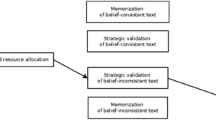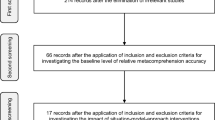Abstract
Learners often have difficulties comprehending multiple texts about controversial scientific issues. In particular, learners with strong prior beliefs tend to construct a one-sided mental representation that is biased towards belief-consistent information (text-belief consistency effect). In the present study we examined the effectiveness of information of three metacognitive strategies tailored to strengthen the comprehension of belief-inconsistent information during multiple text comprehension. According to theories of self-regulated learning, knowledge about relevant metacognitive strategies improves comprehension only when learners are also motivated to use these strategies. These hypotheses were investigated in an experiment in which 85 participants read one belief-consistent and one belief-inconsistent text about a controversial scientific issue. Participants either received information about three metacognitive strategies or no additional information. In addition, participants’ motivation was manipulated by providing them with either negative or positive performance feedback or no feedback. As predicted, a text-belief consistency effect was found, which was eliminated by strengthening the situation model for the belief-inconsistent text only when learners received information about relevant metacognitive strategies and were motivated to use these strategies after positive performance feedback.



Similar content being viewed by others
References
Amstad, T. (1978). Wie verständlich sind unsere Zeitungen? [How understandable are our newspapers?]. Switzerland: Unpublished doctoral dissertation, University of Zürich.
Baker, L. (1985). Differences in the standards used by college students to evaluate their comprehension of expository prose. Reading Research Quarterly, 20, 297–313.
Baker, L. (1989). Metacognition, comprehension monitoring and the adult reader. Educational Psychology Review, 1, 3–38.
Baker, L., & Anderson, R. I. (1982). Effects of inconsistent information on text processing: evidence for comprehension monitoring. Reading Research Quarterly, 17, 281–294.
Baker, L., & Beall, L. C. (2009). Metacognitive processes and reading comprehension. In S. E. Israel & G. G. Duffy (Eds.), Handbook of research on reading comprehension (pp. 373–388). New York: Routledge.
Baker, L., & Brown, A. L. (1984). Metacognitive skills and reading. In P. D. Pearson, R. Barr, M. L. Kamil, & P. Mosenthal (Eds.), Handbook of reading research (pp. 353–394). New York: Longman.
Bandura, A. (1986). Social foundations of thought and action. Englewood Cliffs: Prentice-Hall.
Bandura, A. (1997). Self-efficacy: the exercise of control. New York: W. H. Freeman.
Bandura, A., & Locke, E. A. (2003). Negative self-efficacy and goal effects revisited. Journal of Applied Psychology, 88, 87–99.
Bartlett, F. C. (1932). Remembering: a study in experimental and social psychology. Cambridge: Cambridge University Press.
Britt, M. A., Perfetti, C. A., Sandak, R., & Rouet, J.-F. (1999). Content integration and source separation in learning from multiple texts. In S. R. Goldman, A. C. Graesser, & P. van den Broek (Eds.), Narrative comprehension, causality, and coherence: essays in honor of Tom trabasso (pp. 209–233). Mawah: Erlbaum.
Britt, M. A., & Aglinskas, C. (2002). Improving students’ ability to identify and use source information. Cognition and Instruction, 20, 485–522.
Chinn, C. A., & Brewer, W. F. (1993). The role of anomalous data in knowledge acquisition: a theoretical framework and implications for science education. Review of Educational Research, 63, 1–49.
Cohen, J. (1988). Statistical power analysis for the behavioral sciences (2nd edn). Hillsdale: Erlbaum.
Donovan, J. J., & Williams, K. J. (2003). Missing the mark: effects of time and causal attributions on goal revision in response to goal-performance discrepancies. Journal of Applied Psychology, 88, 379–390.
Eagly, A. H., & Chaiken, S. (1993). The psychology of attitudes. Fort Worth: Harcourt, Brace, Jovanovich.
Faul, F., Erdfelder, E., Lang, A.-G., & Buchner, A. (2007). G*power 3: a flexible statistical power analysis program for the social, behavioral, and biomedical sciences. Behavior Research Methods, 39, 175–191.
Flavell, J. H. (1976). Metacognitive aspects of problem solving. In L. B. Resnick (Ed.), The nature of intelligence (pp. 231–235). Hillsdale: Erlbaum.
Graesser, A. C. (1981). Prose comprehension beyond the word. New York: Springer.
Hasselhorn, M. (1996). Kategoriales Organisieren bei Kindern: Zur Entwicklung einer Gedächtnisstrategie [Categorial organization in children: On the development of a memory strategy]. Göttingen: Hogrefe.
Ilies, R., & Judge, T. A. (2005). Goal regulation across time: the effects of feedback and affect. Journal of Applied Psychology, 90, 453–467.
Isberner, M.-B., & Richter, T. (2013a). Can readers ignore implausibility? Evidence for nonstrategic monitoring of event-based plausibility in language comprehension. Acta Psychologica, 142, 15–22.
Isberner, M.-B., & Richter, T. (2013b). Comprehension and validation: separable stages of information processing? A case for epistemic monitoring in language comprehension. In D. N. Rapp & J. Braasch (Eds.), Processing inaccurate information: theoretical and applied perspectives from cognitive science and the educational sciences. Boston: MIT Press.
Johnson, H. M., & Seifert, C. M. (1994). Sources of the continued influence effect: when discredited information in memory affects later inferences. Journal of Experimental Psychology: Learning, Memory, and Cognition, 20, 1420–1436.
Kardash, C. A. M., & Scholes, R. J. (1995). Effects of pre-existing beliefs and repeated readings on belief change, comprehension, and recall of persuasive text. Contemporary Educational Psychology, 20, 201–221.
Kintsch, W. (1988). The role of knowledge in discourse comprehension: a construction-integration model. Psychological Review, 95, 163–182.
Krenn, B., Würth, S., & Hergovich, A. (2013). The impact of feedback on goal setting and task performance. Swiss Journal of Psychology, 72, 79–89.
Limon, M., & Mason, L. (2002). Reconsidering conceptual change: issues in theory and practice. Amsterdam: Kluwer.
Lombardi, D. A. (2012). Students’ Conceptions about climate change: using critical evaluation to influence plausibility reappraisals and knowledge reconstruction. Las Vegas: Unpublished dissertation, University of Nevada.
Lombardi, D., Sinatra, G. M., & Nussbaum, E. M. (2013). Plausibility reappraisals and shifts in middle-school students’ climate change conceptions. Learning and Instruction, 27, 50–62.
Magliano, J. P., Trabasso, T., & Graesser, A. C. (1999). Strategic processing during comprehension. Journal of Educational Psychology, 91, 615–629.
Mason, L., Boldrin, A., & Ariasi, N. (2010). Searching the web to learn about a controversial topic: are students epistemically active? Instructional Science, 38, 607–633.
Maier, J., & Richter, T. (2013a). Text-belief consistency effects in the comprehension of multiple texts with conflicting information. Cognition and Instruction, 31, 151–175.
Maier, J., & Richter, T. (2013b). How nonexperts understand conflicting information on social science issues: the role of perceived plausibility and reading goals. Journal of Media Psychology, 25, 14–26.
Maxwell, S. E., & Delaney, H. D. (2000). Designing experiments and analyzing data: a model comparison perspective. Mawah: Erlbaum.
Myers, M., & Paris, S. (1978). Children’s metacognitive knowledge about reading. Journal of Educational Psychology, 70, 680–690.
Nickerson, R. S. (1998). Confirmation bias: a ubiquitous phenomenon in many guises. Review of General Psychology, 2, 175–220.
Nokes, J. D., Dole, J. A., & Hacker, D. (2007). Teaching high school students to use heuristics while reading historical texts. Journal of Educational Psychology, 99, 492–504.
Paris, S. G., Lipson, M. Y., & Wixson, K. K. (1983). Becoming a strategic reader. Contemporary Educational Psychology, 8, 293–316.
Perfetti, C. A., Rouet, J.-F., & Britt, M. A. (1999). Toward a theory of documents representation. In H. van Oostendorp & S. R. Goldman (Eds.), The construction of mental representations during reading (pp. 99–122). Mawah: Erlbaum.
Phillips, J. M., Hollenbeck, J. R., & Ilgen, D. R. (1996). Prevalence and prediction of positive discrepancy creation: examining a discrepancy between two self-regulation theories. Journal of Applied Psychology, 81, 498–511.
Pomerantz, E. M., Chaiken, S., & Tordesillas, R. S. (1995). Attitude strength and resistance processes. Journal of Personality and Social Psychology, 69, 408–419.
Pratkanis, A. R. (1989). The cognitive representation of attitudes. In R. Pratkanis, S. Breckler, & S. Greenwald (Eds.), Attitude structure and function (pp. 70–98). Hillsdale: Erlbaum.
Rapp, D., & Mensink, M. (2011). Focusing effects from online and offline reading tasks. In M. T. McCrudden, J. P. Magliano, & G. Schraw (Eds.), Text relevance and learning from text (pp. 141–164). Charlotte: Information Age Publishers.
Richter, T. (2011). Cognitive flexibility and epistemic validation in learning from multiple texts. In J. Elen, E. Stahl, R. Bromme, & G. Clarebout (Eds.), Links between beliefs and cognitive flexibility (pp. 125–140). Berlin: Springer.
Richter, T., & Schmid, S. (2010). Epistemological beliefs and epistemic strategies in self-regulated learning. Metacognition and Learning, 5, 47–65.
Richter, T., Schroeder, S., & Wöhrmann, B. (2009). You don’t have to believe everything you read: background knowledge permits fast and efficient validation of information. Journal of Personality and Social Psychology, 96, 538–598.
Richter, T., & van Holt, N. (2005). ELVES: Ein computergestütztes Diagnostikum zur Erfassung der Effizienz von Teilprozessen des Leseverstehens. Diagnostica, 51, 169–182.
Ross, L., Lepper, M. R., & Hubbard, M. (1975). Perseverance in self-perception and social perception: biased attributional processes in the debriefing paradigm. Journal of Personality and Social Psychology, 32, 880–892.
Rouet, J.-F. (2006). The skills of document use: from text comprehension to web-based learning. Mahwah: Erlbaum.
Schank, R. C., & Abelson, R. (1977). Scripts, plans, goals, and understanding. Hillsdale: Erlbaum.
Schmalhofer, F., & Glavanov, D. (1986). Three components of understanding a programmer’s manual: verbatim, propositional, and situational representations. Journal of Memory and Language, 25, 279–294.
Schroeder, S., Richter, T., & Hoever, I. (2008). Getting a picture that is both accurate and stable: situation models and epistemic validation. Journal of Memory and Language, 59, 237–259.
Schunk, D. H., & Zimmerman, B. (2009). Motivation and self-regulated learning: theory, research, and applications. New York: Routledge.
Singer, M. (2006). Verification of text ideas during reading. Journal of Memory and Language, 54, 574–591.
Smith, D. A., & Graesser, A. C. (1981). Memory for actions in scripted activities as a function of typicality, retention interval, and retrieval task. Memory and Cognition, 9, 550–559.
Stadtler, M., & Bromme, R. (2004). Laypersons searching the WWW for medical information: the role of metacognition. In K. Forbus, D. Gentner, & T. Reiger (Eds.), Proceedings of the 26th annual conference of the cognitive science society (p. 1638). Mahwah: Erlbaum.
Stadtler, M., & Bromme, R. (2007). Dealing with multiple documents on the WWW: the role of metacognition in the formation of documents models. Computer-Supported Collaborative Learning, 2, 191–210.
Stiftung Warentest (2012). Online-Umfrage Impfen: Ergebnisse im Detail [Online survey on vaccinations: Detailed results] [Online document]. Retrieved June 20, 2012, from http://www.test.de/Online-Umfrage-Impfen-Ergebnisse-im-Detail-4371826-0/
Strømsø, H., Bråten, I., & Britt, M. A. (2010). Reading multiple texts about climate change: the relationship between memory for sources and text comprehension. Learning & Instruction, 20, 192–204.
Tolli, A. P., & Schmidt, A. M. (2008). The role of feedback, causal attributions, and self-efficacy in goal revision. Journal of Applied Psychology, 93, 692–701.
van Dijk, T. A., & Kintsch, W. (1983). Strategies of discourse comprehension. New York: Academic.
Vosniadou, S. (1994). Capturing and modeling the process of conceptual change. Learning and Instruction, 4, 45–69.
Walsh, C. R., & Johnson-Laird, P. N. (2009). Changing your mind. Memory & Cognition, 37, 624–631.
Wineburg, S. S. (1991). Historical problem solving: a study of the cognitive processes used in the evaluation of documentary and pictorial evidence. Journal of Educational Psychology, 83, 73–87.
Wiley, J. (2005). A fair and balanced look at the news: what affects memory for controversial arguments? Journal of Memory and Language, 53, 95–109.
Zimmerman, B. J. (2000). Attaining self-regulation: a social cognitive perspective. In M. Boekaerts, P. R. Pintrich, & M. Zeidner (Eds.), Handbook of self-regulation (pp. 13–39). San Diego: Academic.
Acknowledgments
The research reported in this article was supported by the German Research Association (Deutsche Forschungsgemeinschaft, DFG, grant RI 1100/5–1 and grant RI 1100/5–2). We would like to thank Irina Fix, Sven Gruß, Markus Kumsteller, Lina Krüger, Sascha Müller and Veronika Schmitt for their help in preparing stimulus materials and collecting data.
Author information
Authors and Affiliations
Corresponding author
Rights and permissions
About this article
Cite this article
Maier, J., Richter, T. Fostering multiple text comprehension: How metacognitive strategies and motivation moderate the text-belief consistency effect. Metacognition Learning 9, 51–74 (2014). https://doi.org/10.1007/s11409-013-9111-x
Received:
Accepted:
Published:
Issue Date:
DOI: https://doi.org/10.1007/s11409-013-9111-x




